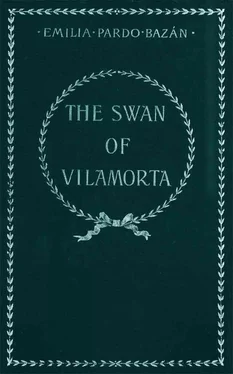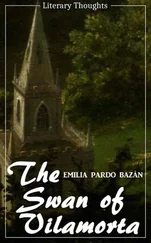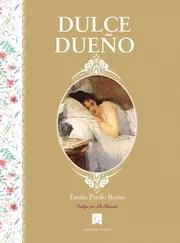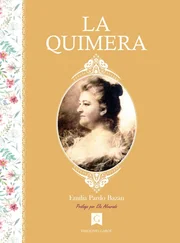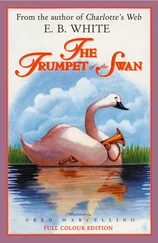Emilia Pardo Bazán - The Swan of Vilamorta
Здесь есть возможность читать онлайн «Emilia Pardo Bazán - The Swan of Vilamorta» — ознакомительный отрывок электронной книги совершенно бесплатно, а после прочтения отрывка купить полную версию. В некоторых случаях можно слушать аудио, скачать через торрент в формате fb2 и присутствует краткое содержание. Жанр: unrecognised, на английском языке. Описание произведения, (предисловие) а так же отзывы посетителей доступны на портале библиотеки ЛибКат.
- Название:The Swan of Vilamorta
- Автор:
- Жанр:
- Год:неизвестен
- ISBN:нет данных
- Рейтинг книги:5 / 5. Голосов: 1
-
Избранное:Добавить в избранное
- Отзывы:
-
Ваша оценка:
- 100
- 1
- 2
- 3
- 4
- 5
The Swan of Vilamorta: краткое содержание, описание и аннотация
Предлагаем к чтению аннотацию, описание, краткое содержание или предисловие (зависит от того, что написал сам автор книги «The Swan of Vilamorta»). Если вы не нашли необходимую информацию о книге — напишите в комментариях, мы постараемся отыскать её.
The Swan of Vilamorta — читать онлайн ознакомительный отрывок
Ниже представлен текст книги, разбитый по страницам. Система сохранения места последней прочитанной страницы, позволяет с удобством читать онлайн бесплатно книгу «The Swan of Vilamorta», без необходимости каждый раз заново искать на чём Вы остановились. Поставьте закладку, и сможете в любой момент перейти на страницу, на которой закончили чтение.
Интервал:
Закладка:
Chapter I.
Behind the pine grove the setting sun had left a zone of fire against which the trunks of the pine trees stood out like bronze columns. The path was rugged and uneven, giving evidence of the ravages wrought by the winter rains; at intervals loose stones, looking like teeth detached from the gum, rendered it still more impracticable. The melancholy shades of twilight were beginning to envelop the landscape; little by little the sunset glow faded away and the moon, round and silvery, mounted in the heavens, where the evening star was already shining. The dismal croaking of the frogs fell sharply on the ear; a fresh breeze stirred the dry plants and the dusty brambles that grew by the roadside; and the trunks of the pine trees grew momentarily blacker, standing out like inky bars against the pale green of the horizon.
A man was descending the path slowly, bent, apparently, on enjoying the poetry and the peace of the scene and the hour. He carried a stout walking-stick, and as far as one could judge in the fading light, he was young and not ill-looking.
He paused frequently, casting glances to the right and to the left as if in search of some familiar landmark. Finally he stood still and looked around him. At his back was a hill crowned with chestnut trees; on his left was the pine grove; on his right a small church with a mean belfry; before him the outlying houses of the town. He turned, walked back some ten steps, stopped, fronting the portico of the church, examined its walls, and, satisfied at last that he had found the right place, raised his hands to his mouth and forming with them a sort of speaking trumpet, cried, in a clear youthful voice:
"Echo, let us talk together!"
From the angle formed by the walls, there came back instantly another voice, deeper and less distinct, strangely grave and sonorous, which repeated with emphasis, linking the answer to the question and dwelling upon the final syllable:
"Let us talk togethe-e-e-e-r!"
"Are you happy?"
"Happy-y-y-y!" responded the echo.
"Who am I?"
"I-I-I-I!"
To these interrogations, framed so that the answer should make sense with them, succeeded phrases uttered without any other object than that of hearing them reverberated with strange intensity by the wall. "It is a lovely night."—"The moon is shining."—"The sun has set."—"Do you hear me, echo?"—"Have you dreams, echo, of glory, ambition, love?" The traveler, enchanted with his occupation, continued the conversation, varying the words, combining them into sentences, and, in the short intervals of silence, he listened to the faint murmur of the pines stirred by the evening breeze, and to the melancholy concert of the frogs. The crimson and rose-colored clouds had become ashen and had begun to invade the broad region of the firmament over which the unclouded moon shed her silvery light. The honeysuckles and elder-flowers on the outskirts of the pine grove embalmed the air with subtle and intoxicating fragrance. And the interlocutor of the echo, yielding to the poetic influences of the scene, ceased his questions and exclamations and began to recite, in a slow, chanting voice, verses of Becquer, paying no heed now to the voice from the wall, which, in its haste to repeat his words, returned them to him broken and confused.
Absorbed in his occupation, pleased with the harmonious sounds of the verse, he did not notice the approach of three men of odd and grotesque appearance, wearing enormous broad-brimmed felt hats. One of the men was leading a mule laden with a leathern sack filled, doubtless, with the juice of the grape; and as they walked slowly, and the soft clayey soil deadened the noise of their footsteps, they passed close by the young man, unperceived by him. They exchanged some whispered words with one another. "Who is he, man?"—"Segundo."—"The lawyer's son?"—"The same."—"What is he doing? Is he talking to himself?"—"No, he is talking to the wall of Santa Margarita."—"Well, we have as good a right to do that as he has."—"Begin you ——"—"One—two—here goes——"
And from those profane lips fell a shower of vile words and coarse and vulgar phrases, interrupting the Oscuras Golondrinas which the young man was reciting with a great deal of expression, and producing, in the peaceful and harmonious nocturnal silence, the effect of the clatter of brass pans and kettles in a piece of German music. The most refined expressions were in the following style: "D—— (here an oath). Hurrah for the wine of the Border! Hurrah for the red wine that gives courage to man! D——" (the reader's imagination may supply what followed, it being premised that the disturbers of the Becquerian dreamer were three lawless muleteers who were carrying with them an abundant provision of the blood of the grape).
The nymph who dwelt in the wall opposed no resistance to the profanation and repeated the round oaths as faithfully as she had repeated the poet's verses. Hearing the vociferations and bursts of laughter which the wall sent back to him mockingly, Segundo, the lawyer's son, aware that the barbarians were turning his sentimental amusement into ridicule, became enraged. Mortified and ashamed, he tightened his grasp on his stick, strongly tempted to break it on the ribs of some one of them; and, muttering between his teeth, "Kaffirs! brutes! beasts!" and other offensive epithets, he turned to the left, plunged into the pine grove and walked toward the town, avoiding the path in order to escape meeting the profane trio.
The town was but a step away. The walls of its nearest houses shone white in the moonlight, and the stones of some buildings in course of erection, garden walls, orchards, and vegetable beds, filled up the space between the town and the pine grove. The path grew gradually broader, until it reached the highroad, on either side of which leafy chestnut trees cast broad patches of shade. The town was already asleep, seemingly, for not a light was to be seen, nor were any of those noises to be heard which reveal the proximity of those human beehives called cities. Vilamorta is in reality a very small beehive, a modest town, the capital of a district. Bathed in the splendor of the romantic satellite, however, it was not without a certain air of importance imparted to it by the new buildings, of a style of architecture peculiar to prison cells, which an Americanized Galician, recently returned to his native land with a plentiful supply of cash, was erecting with all possible expedition.
Segundo turned into an out-of-the-way street—if there be any such in towns like Vilamorta. Only the sidewalks were paved; the gutter was a gutter in reality; it was full of muddy pools and heaps of kitchen garbage, thrown there without scruple by the inhabitants. Segundo avoided two things—stepping into the gutter and walking in the moonlight. A man passed so close by him as almost to touch him, enveloped, notwithstanding the heat, in an ample cloak, and holding open above his head an enormous umbrella, although there was no sign of rain; doubtless he was some convalescent, some visitor to the springs, who was breathing the pleasant night air with hygienic precautions. Segundo, when he saw him, walked closer to the houses, turning his face aside as if afraid of being recognized. With no less caution he crossed the Plaza del Consistorio, the pride of Vilamorta, and then, instead of joining one of the groups who were enjoying the fresh air, seated on the stone benches round the public fountain, he slipped into a narrow side street, and crossing a retired little square shaded by a gigantic poplar turned his steps in the direction of a small house half hidden in the shadow of the tree. Between the house and Segundo there stood a lumbering bulk—the body of a stage-coach, a large box on wheels, its shafts raised in air, waiting, lance in rest, as it were, to renew the attack. Segundo skirted the obstacle, and as he turned the corner of the square, absorbed in his meditations, two immense hogs, monstrously fat, rushed out of the half-open gate of a neighboring yard, and at a short trot that made their enormous sides shake like jelly, made straight for the admirer of Becquer, entangling themselves stupidly and blindly between his legs. By a special interposition of Providence the young man did not measure his length upon the ground, but, his patience now exhausted, he gave each of the swine a couple of angry kicks, which drew from them sharp and ferocious grunts, as he ejaculated almost audibly: "What a town is this, good Heavens! Even the hogs must run against one in the streets. Ah, what a miserable place! Hell itself could not be worse!"
Читать дальшеИнтервал:
Закладка:
Похожие книги на «The Swan of Vilamorta»
Представляем Вашему вниманию похожие книги на «The Swan of Vilamorta» списком для выбора. Мы отобрали схожую по названию и смыслу литературу в надежде предоставить читателям больше вариантов отыскать новые, интересные, ещё непрочитанные произведения.
Обсуждение, отзывы о книге «The Swan of Vilamorta» и просто собственные мнения читателей. Оставьте ваши комментарии, напишите, что Вы думаете о произведении, его смысле или главных героях. Укажите что конкретно понравилось, а что нет, и почему Вы так считаете.
